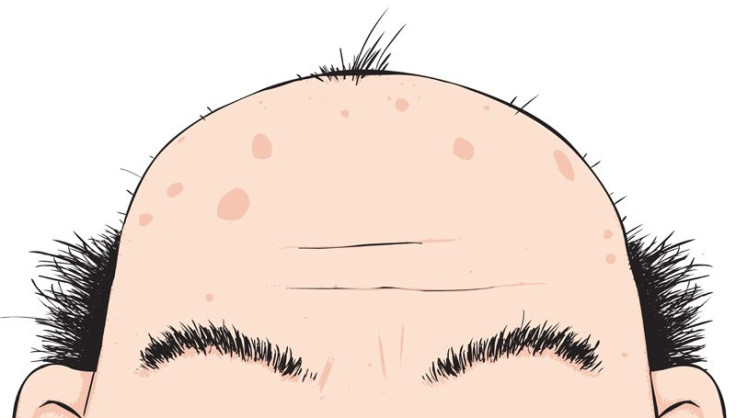Going Bald Isn't Your Mother's Fault; Maternal Genetics Are Not To Blame

You’re only 25 and you’ve begun to lose your hair? Before you freak out (entirely), remember that everyone loses hair routinely and naturally so the fact that your comb looks a little bit clotted right now does not necessarily mean you’re going bald. Importantly, if your hair is falling out in strange clumps, you may be having some extreme stress response or some form of dread illness. Instead of consulting a barber, get yourself to your doctor’s office.
Then again, everything may be exactly as you imagine: you are witnessing the beginning of your own decline (of hair) and your personal encounter with male pattern baldness has begun.
If this is indeed the case, begin the journey with a little knowledge.
Sadly, the symptoms of androgenic alopecia — the official name of male pattern baldness — can begin as early as age 20. With most men, the process begins with a receding hairline and then slowly spreads across the crown. Typically, the entire process from having hair to totally bald takes 15 to 25 years. That said, some men go bald in five years or less.
There is pretty much nothing to do. There’s no cure (despite what advertisers tell you), but there are two somewhat effective treatments… that for some men may come with rather nasty side effects. Propecia (finasteride), a prescription pill that essentially reduces your hormone levels, works best in the early days of hair loss and can slow the process. Rogaine (minoxidil), a topical treatment, also helps to stall the rate at which hair falls out. The negatives for some men may outweigh the positives: Propecia in some cases saves a hairy scalp only to sacrifice a sex drive, while Rogaine, which needs to be applied twice a day, may irritate the skin.
In the end, half of all 50 year old men are bald or balding, and by age 60, two out of three men are hairless as a newly hatched egg. You’re in good company: accept, relax, and shave.
Still, you probably want to address the real question: Why you?
Don’t Blame Mom
Many people believe hair loss is passed down on the mother’s side. While it’s true a key gene for baldness is on the X chromosome, which you get from your mother, it is not the only genetic factor in play since men with bald fathers have an increased chance of going bald when compared to men whose fathers have a full set of hair. While twin studies have confirmed male pattern baldness to be genetically determined, scientists say baldness anywhere in your family may be a sign of your own impending fate.
The most common form of hair loss is the result of your body becoming increasingly sensitive to androgens, a type of male sex hormone.
Normally, each strand of your hair grows for two to six years, and after a resting stage, it falls out and then is replaced by a new strand of hair. With male pattern baldness, the hair follicle (the hole out of which your hair grows) becomes smaller. Growing shorter and finer strands, the follicle eventually gives up and grows no more hair.
Health and Baldness
While for many men, the main impact of baldness is psychological — especially when hair loss begins prematurely in a man's early 20s — there are some physiological downsides to the process. Hair loss quite obviously causes an uptick in a man's risk for skin cancer of the scalp.
More unusually, though, researchers have linked male pattern baldness to an increased incidence of heart disease, hypertension, and high levels of cholesterol. This study found risk of heart attack increased along with spreading baldness on the crown of the head. Another study, which involved 250 men between 35 and 65, found those with a blood pressure reading above 120 over 80 (average) had double the risk of hair loss compared to those without hypertension. And past research has consistently linked excessive hair loss to cholesterol levels. Importantly, in all these cases the doctors say the link between baldness and heart health may be obvious but the underlying reasons are not.
While the experts claim these effects may be due to either excess testosterone or to genes, one thing is certain: Men who experience hair loss should begin watching their blood pressure and cholesterol and overall protecting heart health.
If you begin to lose your hair, read it as a visible sign to begin saving your life. Time to change: quit smoking, curb your drinking, and start an exercise and diet program to promote heart health.



























